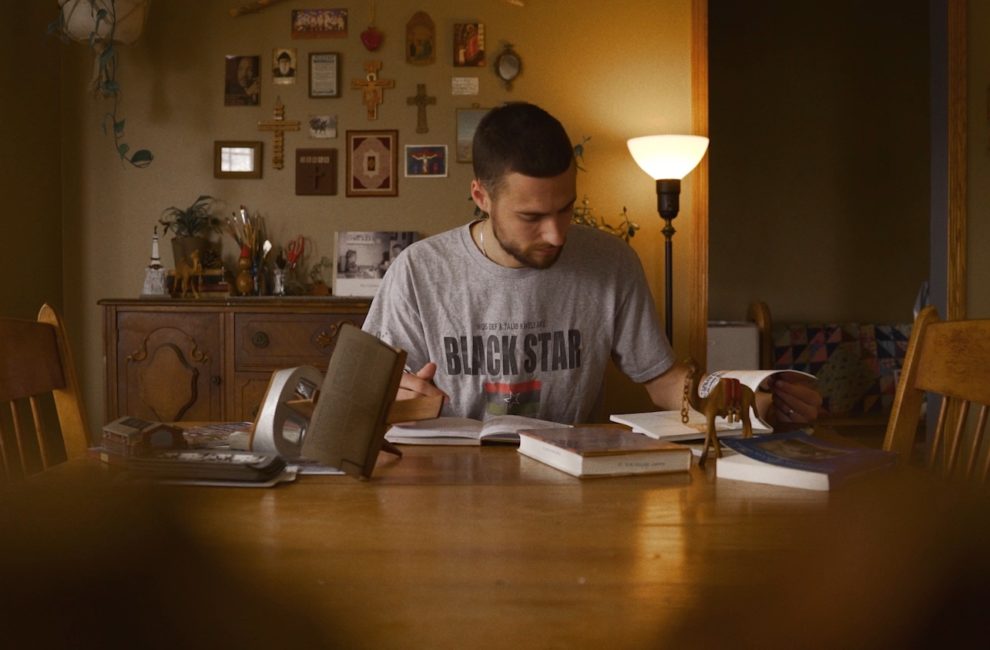
Local filmmaker Josh Chitwood Photo courtesy Josh Chitwood
Indy’s Invisible Immigrants
Although filmmaker Josh Chitwood only moved from Minneapolis to Indy recently, he began working on a documentary about the city’s Arab population several years ago. Being of Lebanese descent himself, Chitwood had a personal connection with the subject, and he recruited the creator of the blog Arab Indianapolis to help him with the research. That film, When We Were Syrian: Early Lebanese in Indianapolis, debuts on Monday, November 8 as part of the Spirit and Place Festival. We sat down with Chitwood to talk about his family history here and the emotional experience of making the film.
How did this project begin?
The film is a reflection of the journey I’ve been on for the past six years. Growing up, I always knew that I was Lebanese, but I didn’t really understand our heritage, nor did most of my family. My maternal lineage came to Indianapolis in the early 1900s from modern-day Lebanon. The last living person of that first-generation was my aunt Louise, who had a house on the west side and lived to be 100 years old. My wife and I had run a small film company in Minneapolis for a couple of years, and I knew that the stories Aunt Louise shared with me were unique, so I wanted to preserve them for my family, at least. I interviewed her in 2016, and what was supposed to be a 5-minute film turned into something longer. It’s one of the most personal projects I’ve worked on.
The title of the documentary suggests that Arab history in Indianapolis is overlooked. How so?
Between 1890 and 1914, about 100,000 Arabic-speaking immigrants came from what is now known as Lebanon, Syria, Jordan, Palestine, and Israel. In Indianapolis, there were about 1,000 of them. Because that number was so small, most people don’t know about them, especially since most early Syrians really wanted to assimilate and be seen as American and white. Out of my Lebanese family, none of them married other Middle Eastern people. That was a very common story: A lot of the culture was not passed down.
What was the process of making the film like?
The start of it was editing that interview with Aunt Louise that I had on my hard drive for four years, which was incredibly emotional because she was like a grandmother to me. From there, I wrote a script to guide the rest of the film and really dug through internet archives. I’ve spent more time on this than anything else I’ve ever created. One day, I stayed up until 4 a.m. because I had that creative push. When I feel the push, I lean into it. I spent so much time tweaking each cut because I wanted it to be seamless.
What role did IUPUI religious studies professor Edward Curtis play in the film?
I came across a blog called Arab Indianapolis, and Edward was the one taking the lead on it. I reached out to him, and he said, “Oh, I see what you do for a living. Would you want to make a documentary?” I told him I had been wanting to do just that for four years. I asked him if he knew where we could get some money to fund the project, and he happened to have a stipend from IUPUI. I’m not a historian, so his participation really helped me provide context and clarity. He wasn’t a producer, but he was a major asset.
You recently moved from Minneapolis to Indianapolis. What brought you here permanently?
Although I grew up elsewhere in the Midwest, both of my parents are from Indianapolis. Indy has always been a home base for me. It’s a city I love deeply, and I believe so much in its potential. So I’ve always wanted to be a part of what goes on here. We still have clients in Minneapolis, but the goal is to build a clientele down here.
You must be excited for your film’s debut at the Central Library. What will be involved with the event?
First, we’re going to show the film. Then Edward and I will do a panel discussion and have a Q and A session with the audience. I think the Central Library is the perfect venue, right in the heart of the city. A lot of people go there to research history, so it’s fitting. I’m really hoping the documentary creates good discussion. One of my goals for the film was to display the value of family and heritage that I think is often lost in Western culture.





